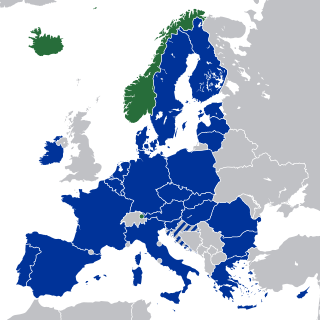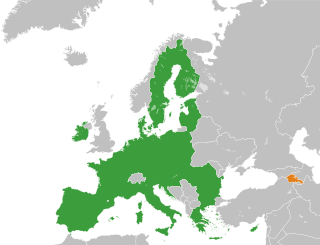
A free trade area is the region encompassing a trade bloc whose member countries have signed a free trade agreement (FTA). Such agreements involve cooperation between at least two countries to reduce trade barriers, import quotas and tariffs, and to increase trade of goods and services with each other. If natural persons are also free to move between the countries, in addition to a free trade agreement, it would also be considered an open border. It can be considered the second stage of economic integration.

The European Economic Area (EEA) was established via the Agreement on the European Economic Area, an international agreement which enables the extension of the European Union's single market to member states of the European Free Trade Association (EFTA). The EEA links the EU member states and three of the four EFTA states into an internal market governed by the same basic rules. These rules aim to enable free movement of persons, goods, services, and capital within the European single market, including the freedom to choose residence in any country within this area. The EEA was established on 1 January 1994 upon entry into force of the EEA Agreement. The contracting parties are the EU, its member states, and Iceland, Liechtenstein, and Norway. New members of EFTA would not automatically become party to the EEA Agreement, as each EFTA State decides on its own whether it applies to be party to the EEA Agreement or not. According to Article 128 of the EEA Agreement, "any European State becoming a member of the Community shall, and the Swiss Confederation or any European State becoming a member of EFTA may, apply to become a party to this Agreement. It shall address its application to the EEA Council." EFTA does not envisage political integration. It does not issue legislation, nor does it establish a customs union. Schengen is not a part of the EEA Agreement. However, all of the four EFTA States participate in Schengen and Dublin through bilateral agreements. They all apply the provisions of the relevant Acquis.
The Canada–United States Free Trade Agreement (CUSFTA), official name as the Free Trade Agreement between Canada and the United States of America, was a bilateral trade agreement reached by negotiators for Canada and the United States on October 4, 1987, and signed by the leaders of both countries on January 2, 1988. The agreement phased out a wide range of trade restrictions in stages, over a ten-year period, and resulted in a substantial increase in cross-border trade as an improvement to the last replaced trade deal. With the addition of Mexico in 1994, CUSFTA was superseded by the North American Free Trade Agreement (NAFTA).

The Central European Free Trade Agreement (CEFTA) is an international trade agreement between countries mostly located in Southeastern Europe. Founded by representatives of Poland, Hungary and Czechoslovakia, CEFTA in 2006 expanded to Albania, Bosnia and Herzegovina, Bulgaria, Croatia, Moldova, Montenegro, North Macedonia, Romania, Serbia, Slovenia and Kosovo.

The Single European Act (SEA) was the first major revision of the 1957 Treaty of Rome. The Act set the European Community an objective of establishing a single market by 31 December 1992, and a forerunner of the European Union's Common Foreign and Security Policy (CFSP) it helped codify European Political Co-operation. The amending treaty was signed at Luxembourg City on 17 February 1986 and at The Hague on 28 February 1986. It came into effect on 1 July 1987, under the Delors Commission.

James Gordon Carr was a Canadian politician, cabinet minister, journalist, and professional oboist. A member of the Liberal Party, he served as the member of Parliament for Winnipeg South Centre from 2015 until his death on December 12, 2022. Carr died days after his Private Members Bill, Bill C-235, An Act respecting the building of a green economy in the Prairies, passed the House and went to the Senate. He last served as the Chair of the Standing Committee on Public Safety and National Security, until his resignation on September 29, 2022.

Daniel Caspary is a German politician who has been serving as a Member of the European Parliament (MEP) since 2004. He is a member of the Christian Democratic Union (CDU), part of the European People's Party (EPP). Daniel Caspary is now in the fourth legislature of the European Parliament. Daniel Caspary lives in Weingarten. He is married and has five children.

The Competition and Consumer Act 2010 (CCA) is an Act of the Parliament of Australia. Prior to 1 January 2011, it was known as the Trade Practices Act 1974 (TPA). The Act is the legislative vehicle for competition law in Australia, and seeks to promote competition, fair trading as well as providing protection for consumers. It is administered by the Australian Competition & Consumer Commission (ACCC) and also gives some rights for private action. Schedule 2 of the CCA sets out the Australian Consumer Law (ACL). The Federal Court of Australia has the jurisdiction to determine private and public complaints made in regard to contraventions of the Act.
A free trade agreement (FTA) or treaty is an agreement according to international law to form a free-trade area between the cooperating states. There are two types of trade agreements: bilateral and multilateral. Bilateral trade agreements occur when two countries agree to loosen trade restrictions between the two of them, generally to expand business opportunities. Multilateral trade agreements are agreements among three or more countries, and are the most difficult to negotiate and agree.

Edward D. "Ed" Fast is a Canadian politician who has served as the member of Parliament (MP) for Abbotsford since 2006. A member of the Conservative Party of Canada, he was Minister for International Trade and Minister for the Asia–Pacific Gateway from 2011 to 2015 under Prime Minister Stephen Harper.
The Agreement on Internal Trade (AIT) entered into force on July 1, 1995, and includes government departments, agencies, commissions and Crown corporations of the 10 Canadian provinces, the three territories and the federal government.
Industrial design rights in the European Union are provided at both the Union level by virtue of the Community design and at the national level under individual national laws.

The Comprehensive Economic and Trade Agreement is a free-trade agreement between Canada and the European Union and its member states. It has been provisionally applied, thus removing 98% of the preexisting tariffs between the two parts.

Brexit was the withdrawal of the United Kingdom from the European Union.

The United Kingdom (UK) was a member of the European Economic Area (EEA) from 1 January 1994 to 31 December 2020, following the coming into force of the 1992 EEA Agreement. Membership of the EEA is a consequence of membership of the European Union (EU). The UK ceased to be a Contracting Party to the EEA Agreement after its withdrawal from the EU on 31 January 2020, as it was a member of the EEA by virtue of its EU membership, but retained EEA rights during the Brexit transition period, based on Article 126 of the withdrawal agreement between the EU and the UK. During the transition period, which ended on 31 December 2020, the UK and EU negotiated their future relationship.

The Agreement between the United States of America, Mexico, and Canada (USMCA) is a free trade agreement among the United States, Mexico, and Canada. It replaced the North American Free Trade Agreement (NAFTA) implemented in 1994, and is sometimes characterized as "NAFTA 2.0", or "New NAFTA", since it largely maintains or updates the provisions of its predecessor. USMCA is one of the world's largest free trade zones, with a population of more than 510 million people and an economy of $30.997 trillion in nominal GDP — nearly 30 percent of the global economy, and the largest of any trade bloc in the world.

The EU–UK Trade and Cooperation Agreement (TCA) is a free trade agreement signed on 30 December 2020, between the European Union (EU), the European Atomic Energy Community (Euratom), and the United Kingdom (UK). It provisionally applied from 1 January 2021, when the Brexit transition period ended, before formally entering into force on 1 May 2021, after the ratification processes on both sides were completed: the UK Parliament ratified on 30 December 2020; the European Parliament and the Council of the European Union ratified in late April 2021.

The United Kingdom Internal Market Act 2020 is an act of the Parliament of the United Kingdom passed in December 2020. Its purpose is to prevent internal trade barriers within the UK, and to restrict the legislative powers of the devolved administrations in economic policy. It is one of several pieces of legislation concerning trade that were passed following the European Union membership referendum, as after Brexit the UK is no longer directly subject to EU law.

The Armenia–EU Comprehensive and Enhanced Partnership Agreement or CEPA is a partnership agreement between the European Union and Armenia. The agreement advances the bilateral relations between the European Union and Armenia to a new, partnership level and regulates cooperation in political and economic sectors, while enhancing trade relations. The agreement develops these areas further, providing a long-term basis for integrating and strengthening EU–Armenia relations. The agreement is also designed to bring Armenian laws and regulations gradually closer to the EU acquis.
The Canadian Free Trade Agreement (CFTA) is an agreement that governs trade between the Canadian provinces and territories that took effect on July 1, 2017, replacing its predecessor, the 22-year old Agreement on Internal Trade (AIT).
















